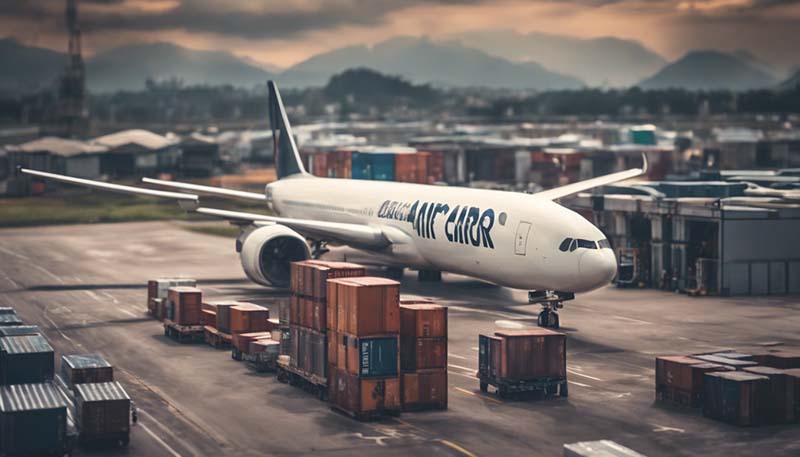Air cargo plays a crucial role in global trade and supply chains, as it enables businesses to transport goods quickly and efficiently across the world. With the rapid growth of international trade and the increasing demand for faster delivery, air cargo has become an indispensable part of the global economy. This article discusses the significance of air cargo in global trade, its impact on supply chains, and the challenges it faces in the modern world.
The Role of Air Cargo in Global Trade
Air cargo is the process of transporting goods via aircraft, which has become an essential component of international trade. It enables businesses to move a wide range of products, from perishable items like fruits and vegetables to high-value goods such as electronics and pharmaceuticals. The following are some of the key roles that air cargo plays in global trade:
1. Speed and Efficiency
One of the most significant advantages of air cargo is its speed. Air transport is much faster than sea or land transportation, allowing businesses to deliver goods to their destination in a matter of hours or days, rather than weeks. This speed is crucial for time-sensitive products, such as fresh produce or temperature-controlled goods, which can spoil or lose their value if not delivered promptly.
2. Global Reach
Air cargo enables businesses to reach markets across the world, connecting countries and continents that would otherwise be difficult or impossible to access through other modes of transportation. This global reach has facilitated the growth of international trade and has allowed businesses to expand their operations to new markets, increasing their customer base and revenue.
Advertisement
3. Reliability and Security
Air cargo is known for its high level of reliability and security. The transportation process is closely regulated and monitored, ensuring that goods are safely and securely transported from one location to another. This is particularly important for high-value or sensitive items, which may be at risk of theft or damage during transportation.
The Impact of Air Cargo on Supply Chains
Air cargo has a significant impact on the efficiency and effectiveness of supply chains. By providing a fast, reliable, and secure means of transportation, air cargo allows businesses to reduce lead times, optimize inventory levels, and respond quickly to changes in market demand. The following are some of the ways air cargo influences supply chains:
1. Just-in-Time (JIT) Inventory Management
Just-in-time (JIT) inventory management is a strategy that aims to minimize the amount of inventory held by a business, reducing storage costs and waste. Air cargo enables businesses to implement JIT by providing a fast and reliable means of transportation, allowing them to order and receive goods as needed, rather than maintaining large stockpiles of inventory.
2. Reducing Supply Chain Risks
Air cargo can help businesses mitigate risks in their supply chains by providing alternative transportation routes and backup options in case of disruptions. For example, if a natural disaster or political unrest disrupts a primary shipping route, air cargo can be used as an alternative to ensure the timely delivery of goods.
3. Supporting E-commerce Growth
The growth of e-commerce has led to an increased demand for fast and efficient delivery of goods, and air cargo plays a vital role in meeting this demand. By providing quick and reliable transportation, air cargo enables businesses to deliver products to customers around the world, often within a matter of days.
Challenges Facing Air Cargo in the Modern World
Despite its importance in global trade and supply chains, air cargo faces several challenges in the modern world. The following are some of the key issues the industry must address to maintain its relevance and continue to support the growth of international trade:
1. Environmental Concerns
The aviation industry, including air cargo, is a significant contributor to global greenhouse gas emissions. As concerns about climate change and environmental sustainability grow, the industry must find ways to reduce its environmental impact, such as investing in more fuel-efficient aircraft and exploring alternative fuels.
2. Rising Costs
Operating costs for air cargo have been steadily increasing due to factors such as rising fuel prices, labor costs, and regulatory compliance. To remain competitive and sustainable, the industry must find ways to reduce costs and improve efficiency.

3. Security and Safety Regulations
The need to maintain high levels of security and safety in air cargo transportation has led to increasingly strict regulations and procedures. While these measures are essential to protect public safety and prevent terrorism, they can also create delays and increase costs for businesses. The industry must continue to balance security needs with the efficient movement of goods.
Conclusion
Air cargo is a vital component of global trade and supply chains, providing speed, efficiency, and reliability that enable businesses to meet the demands of an increasingly interconnected world. However, the industry must continue to adapt and innovate to address the challenges it faces, such as environmental concerns, rising costs, and security regulations. By doing so, air cargo can maintain its essential role in the global economy and support the growth of international trade for years to come.